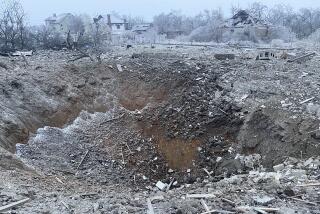Pause in Strikes on Belgrade May Be Permanent
- Share via
WASHINGTON — NATO warplanes have dropped no bombs on downtown Belgrade since the attack on the Chinese Embassy 11 days ago, and allied officials suggested Tuesday that the pause could become permanent.
Such a move would raise questions about the extent to which the outcry over unintended civilian casualties is forcing NATO commanders to be cautious at a moment when they had hoped to intensify the air campaign.
U.S. and NATO officials say they have already inflicted considerable damage on their top targets in the center of the Yugoslav capital and might not need to conduct further strikes in an area that is congested and filled with sensitive civilian and diplomatic sites.
The moratorium, if it sticks, would appear understandable enough after the embassy tragedy, which killed three Chinese journalists and sent U.S.-China relations to perhaps their lowest point in years. NATO later said the attack was an error.
Yet an end to air assaults on the city would also ease the psychological pressure that some alliance officials thought would help drive the Yugoslav government to the bargaining table, analysts say.
NATO’s cautiousness affects the selection of targets not only in Belgrade and other large cities but in remote areas of Kosovo. As was evident Thursday, when NATO warplanes killed dozens of ethnic Albanians in the southern Kosovo town of Korisa, NATO commanders are struggling with what they say is the Yugoslav military’s increasing use of ethnic Albanians as “human shields” to protect military personnel and field equipment. While they insist this strategy will not keep the alliance from striking key targets, doing so often carries huge political and humanitarian risks.
Alliance officials say publicly that there has been no policy change since May 8, when a B-2 bomber, relying on faulty intelligence, dropped laser-guided bombs on the Chinese Embassy.
There has been “no conscious decision by anyone to avoid downtown at all,” said Air Force Maj. Gen. Charles Wald, a senior planner with the Joint Chiefs of Staff.
But some NATO officials acknowledge privately that they would risk a downtown strike now only if it they believed their target to have great strategic value.
Said one alliance official: “I wouldn’t exclude it. But it would have to be an important part of the Yugoslav command-and-control structure. The pressure is really on the military to destroy the [Yugoslav army and police] targets on the ground in Kosovo.”
Since the bombing began March 24, NATO has struck a variety of targets in downtown Belgrade, including the Yugoslav and Serbian ministries of defense and interior, the offices of political parties, TV stations and Yugoslav President Slobodan Milosevic’s villa in the expensive Dedinje neighborhood.
Officials have said the targets were chosen in accordance with NATO’s declared goal of “degrading” the Yugoslav military, but they also have acknowledged that they hoped to bring pressure on Milosevic and the small group of his cronies that runs the country.
Outside experts say that after eight weeks of bombing, NATO probably has hit most of the strategically valuable targets in the downtown area. But some say a cessation of strikes on the symbolic heart of Serbia, Yugoslavia’s dominant republic, could allow the leadership to feel it has outlasted NATO’s attacks.
Pulling back “hands them a propaganda victory,” said Milan Vego, a former officer in the Yugoslav military who is now at the U.S. Naval War College. That possibility is one reason why bombing urban areas such as downtown Belgrade was never a particularly good idea, he said.
Ivo Daalder, who served on the National Security Council earlier in President Clinton’s administration, said the temporary pullback was motivated by a realization that NATO can’t afford any mistake that could raise political pressure for a halt to the air campaign.
But the alliance’s “bigger problem,” he said, is that the strikes needed to drive Milosevic to the bargaining table are causing civilian casualties that turn parts of the Western public against the effort.
“They need to intensify, yet the very intensification causes these casualties that reduce support for the strategy,” he said. ‘They’re in a pickle.”
*
Times staff writer John-Thor Dahlburg in Paris contributed to this report.
* BLAIR’S BATTLE: The rift between Britain and allies over ground troops stems from internal politics. A14
More to Read
Sign up for Essential California
The most important California stories and recommendations in your inbox every morning.
You may occasionally receive promotional content from the Los Angeles Times.














